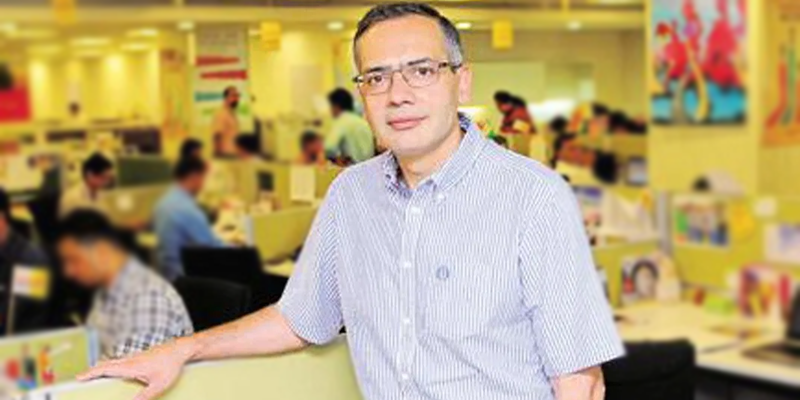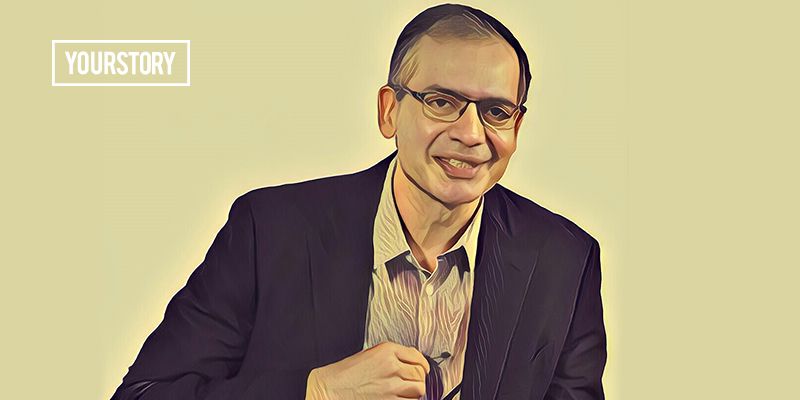

MakeMyTrip Founder Deep Kalra
Battered by the coronavirus pandemic that crashed its revenues to zero, India’s largest online travel booking company MakeMyTrip was forced to let go of 350 people, which is nearly 10 percent of its staff, in June.
Initially, around March-end when the country entered into the first phase of the lockdown, the company had hoped it would not have to fire any of its employees, having affected pay cuts across the board.
“But then, two months into the pandemic we realised this is going to take longer and we had to take a very tough decision. I think it's fair to say the toughest decision we have ever taken, which was a large scale retrenchment — almost 10 percent of our staff, which was 350 people — we had to ask to go,” MakeMyTrip Founder Deep Kalra said during a recent chat with YourStory Founder and CEO Shradha Sharma. The company has around 3,200 employees on its rolls.
The layoffs were from businesses which the company thought would not come back in a long time or at least would not be done the same way. These were primarily the retail businesses, which the Nasdaq-listed Gurugram company is in the process of converting into franchises and hopes people will still have gainful employment in these functions when the stores come back in their new avatars.
“But I don’t think we want those (jobs) on our rolls, we were anyway talking about restructuring this (retail business). But it was a tough time. I know for Rajesh (Magow, MakeMyTrip Co-founder and CEO) and myself, we had many sleepless nights. As did our HR, as did every leader, actually. It’s very hard."
“I think for us, the way we are wired — we are Indian, we don’t have that hire-fire mentality — at least, we certainly don’t. Asking one person to go for (a) reason (that’s) not his or her fault is hard and when you do it mass-scale, it’s very hard,” Deep said.
In March, the World Travel and Tourism Council had warned that 50 million jobs in the travel and tourism industry could be lost worldwide due to the coronavirus pandemic. It projected Asia as being the worst affected with the possibility of 30 million job losses in the continent.

Deep Kalra started MakeMyTrip at the age of 30 in 2000
The 50-year-old founder of one of India’s early internet successes who went on to become a poster boy for the Indian startup ecosystem and the online travel industry, said, the company wanted to ensure the separation process, albeit painful, was made as easy as possible.
“It’s the right thing to do. So we did extend the benefits and perks, whether it was medical insurance till a whole year, we did let them keep the laptops [sic]. For people who had done long service, we did even more, like linked to how long they had served us."
“And then, even on a personal front, both Rajesh and I wanted to help anyone who had done a long time with us, more than 10 years, which we did. But it’s the worst thing to do and hopefully we never ever have to do that again,” he said.
At the peak of the pandemic, as travelling came to a standstill, MakeMyTrip’s revenues plummeted from $500 million a month revenue run rate to zero. “We did $6 billion gross booking (in) the last year, the last fiscal that we reported and we were suddenly down to zero,” Deep said.
He reflected on the irony that 20 years after the travel company was launched on April 1, 2000, it found itself in a position where on its anniversary there was virtually no travel happening, with everyone locked down inside their homes.
“We had our earnings call for the worst hit quarter, which is April, May and June, which is the first quarter of our fiscal and it’s open knowledge, since we are a public company, we were 95-96 percent down on revenues. So I was half jokingly saying, this should be called a lack of earnings call not an earnings call,” Deep said.
 Also ReadFrom humble village boy to billionaire: Byju’s success mantra revealed
Also ReadFrom humble village boy to billionaire: Byju’s success mantra revealed
After assessing the initial damage to the business, the MakeMyTrip management got down to figuring out the things they could control to salvage the situation. “We are in travel, not really diversified. So it’s been great for us for so long. We can sit and mope or fret and get into a panic, but neither of those are going to solve our problems,” Deep said.
The management figured the “only thing” it could do was act on two fronts — cutting costs and keeping employees’ motivation levels up, which became even more critical in the backdrop of the job cuts.
Deep elaborated: “How could we be completely maniacal about cutting down on cost wherever possible? So variable costs were (a) little easier, most of them were related to marketing and sales promotion. Semi-fixed cost, which was outsourced partners for post-sales service, call centres was a little harder, but again we gave notices, we negotiated, and we cut back. And the toughest of all, of course, was when it came down to people-cost.”
According to the company, it tried to do everything possible to avoid the layoffs, especially through the deep pay cuts at the top, but eventually had to take the tough call of letting people go after an extended phase of little or no business.
“So, we took cuts, personal cuts in salaries at all levels, literally starting with managerial level at 10 percent, going all the way up to the top where Rajesh and I are still basically going 100 percent cut [sic] because it was not only symbolic but it was the right thing to do. "
“Our entire leadership team, I think it was creditable (that) they took a 50 percent cut and they continue to do so. And even though travel is coming back and now we have started restoring, it’s been (a) good four-five months of being like that,” Deep said.
 Also ReadStarting Apollo Hospitals at the age of 50, Dr Prathap Reddy was called a ‘fool’
Also ReadStarting Apollo Hospitals at the age of 50, Dr Prathap Reddy was called a ‘fool’
MakeMyTrip started restoring salaries of employees till the senior manager level by July end, once the business started to come back. “Some of our lines of business have definitely started like domestic flights, I think we are back now at 15-20 percent capacity, which is a start,” Deep said. For hotel bookings, demand is at 10-12 percent of the capacity, as is the demand for bus and other inter-city travel modes, he added.
(Edited by Megha Reddy)
Want to make your startup journey smooth? YS Education brings a comprehensive Funding Course, where you also get a chance to pitch your business plan to top investors. Click here to know more.
Original Source: yourstory.com
6 Ways My Parents Taught Me Financial Independence
Want to teach your kids financial independence? Here’s how mine did!
“Hey Mum, this is my friend Daniel from school.”
“Nice to meet you, Daniel, and welcome to our home! Joel, do you want to wash the dishes, hang the laundry, or vacuum the house?”
“Ah, Mum… Daniel came over to play. Can I pleeeeease skip my chores today?”
“Nope. If you live in this house, you must do chores. Sorry Daniel, that’s the way it is around here.”
“OK, fine. C’mon Daniel, it’ll only take 10 minutes to bust out these dishes and then we can go practice skateboarding in the driveway.”
Teaching Kids Independence: Financial or Otherwise
I can’t thank my parents enough. Growing up, what I called “torture” at the time was actually just stellar parenting. The lessons my Mum and Dad ingrained in me back then gave me a huge advantage today. They taught me how to think, live, and thrive independently.
I am by no means perfect, and I’m sure my parents would say they did a bunch of stuff wrong when raising me. But, I became self-sufficient very early in life, and that made me confident in taking care of myself and gave me a good start on my journey toward financial freedom. Here are some fun stories from my childhood:
Lesson #1: Everybody Works. Life IS Work.
No matter how much I complained, negotiated, or pretended to be sick, my parents would never let me out of doing daily chores. Mum put a chore chart on the fridge with a morning and an afternoon task for every day of the week. These mandatory chores started when I was about 6 years old and continued until I moved out at age 22.
Dishes, laundry, washing walls, scrubbing toilets, vacuuming, making dinner for the family, changing bed sheets, gardening, car washing … You name it — my siblings and I did it. There was no compensation, weekly allowance, or reward for these jobs. It was just the cost of living.
Of course, I thought this was horribly unfair at the time! My friends at school would get paid $5 by their parents to clean their room once in a while. I was paid $0 for 10 times as many chores!
But, all this manual labor taught me a solid work ethic. I learned how to do things myself, without dependencies or hired help. When it came time to move out of home and run my own household, it was an easy transition.
Lesson #2: Independence vs. Interdependence
Learning how to take care of yourself is important. But, learning how to *also* take care of others and contribute to a community is equally important. Looking back, the household chores my parents made me do went way beyond cleaning up after myself.
When I helped prepare lunches in the morning for our entire family, everyone benefited. It meant someone else was going to help make my school lunches the week after. When I folded 7 loads of family laundry, it meant that one of my siblings was vacuuming that day so I didn’t have to.
If everyone pitches in, everyone benefits.
Personal independence is important, but Mum and Dad made sure my siblings and I grew up contributing to a society that also took care of us in return. That’s how the real world works. We should all contribute, according to our means and capacities.
Lesson #3: Personal Responsibility
Here’s a few things I remember growing up…
My parents didn’t let me drive their car until I showed them a bank account statement with an $800 balance. This was the deductible for their car insurance policy.
If I went out with friends on a night when it was my turn to make dinner, I had to buy take-out for the whole family with my own money.
If I slept in and was late to school, my parents threatened to charge me $6. This was the per-day expense they paid for my school at the time. (Honestly, I don’t recall them fully enforcing this. I could be wrong). They saw my education as an investment, and if they let me sleep in without consequences, it would demonstrate that the investment had no value. Charging me for missed school meant me owning responsibility.
When I made a commitment or set a goal, they would hold me to it at all costs. Well, reasonable costs 🙂
These stories might seem harsh. But they were all blessings in disguise. As a kid I was held to the same personal responsibilities that most adults live by. (Actually, I still don’t think many adults have enough $ in their checking account to cover their car insurance deductible. WHY are they driving!?)
Lesson #4: Financial Responsibility: The “Bank of Mum and Dad” Doesn’t Exist!
My parents would cover the basic costs for us kids, but they weren’t going to fund an excessive lifestyle. They bought us clothes, but if we wanted anything ‘designer style’ or if we wanted fancy sports gear, we had to chip in and buy it ourselves. They encouraged us to earn our own money.
From about age 14 onwards I was earning about $50-100 per week working at McDonald’s. I could afford my own movie tickets, skateboards, games, and after-school activities or clubs. (I remember that I paid $10 a week for breakdance lessons on Tuesday nights after high school. Don’t laugh — breakdancing was cool back then!)
In my later teens, my siblings and I each paid my parents $10 per week for access to their car when they weren’t using it. At age 18, my parents started charging me rent to live in my own room! (According to Mum, after high school I showed no signs of “moving on” — so she increased my cost of living to encourage me to work/earn more.)
You might be wondering if my parents were trying to make a profit off us kids! It’s actually the opposite. They gave us everything they could. By slowly introducing living expenses, I learned money management skills and became a self-sufficient adult child sooner rather than later. I also learned that if I wanted the finer things in life, there was no entitlement or financial help. I would need to get off my butt and earn stuff myself.
Honestly, if Mum and Dad never forced rent on me, I would have never moved out. In fact, if they’re willing to take me back tomorrow rent-free, I’ll start packing tonight! 😉
Lesson #5: Budgeting and Money Management
My parents taught me to keep a detailed ledger for every cent I ever earned. 10% of all income went to charity, 45% went to piggy bank savings, and 45% I could spend however I wanted.
If I earned $2 cleaning the old lady’s gutter down the street, I would have 20 cents for charity, 90 cents for my savings account, and 90 cents to buy candy 🙂
Mum and Dad were pretty open about their own budget. They showed me how they pay bills (with a credit card to earn points, then pay the card off immediately with cash). They took me to meetings at our credit union. We sat down to review phone bills together, grocery receipts, and my Dad showed me how to file tax returns manually.
I remember hating all this at the time … it was like extra math homework! But it taught me financial literacy and prepared me for budgeting in the real world. I’ve never been in debt, my income has always trumped expenses, and saving money has always taken priority over spending.
Lesson #6: Cooking and Grocery Shopping
Recently, one of my friends asked me how to cut an onion. This person is in their late 20’s, and had never cut one before. At first I thought it was a joke … but they were dead serious. Making meals using raw materials was hard for them because they never learned to cook growing up.
I remember my Mum taking me and my siblings to the market and different food stores each week. She showed us which shops had the cheapest deals for meats, vegetables, milk, etc. She taught us how to cook meals for the family like lasagna, shepherd’s pie or baked meat and vegetables.
Learning how to cook gave me freedom as a teenager, and it helped me financially as a young person. Teaching me and my siblings how to cook also freed up my parents because we were not dependent on them for every meal.
Caveat: I’m Not a Parent!
Being a parent is the hardest job in the world, I can only imagine. My wife and I don’t have any children right now, so I can’t really say from experience how to teach kids financial independence.
But I did learn about financial independence from my parents, and I’m sharing these stories because it’s a frequent topic in our financial freedom community and I wanted to give input based on personal experiences. If/when I do have my own kids, I’ll be trying my best to pass down some of these financial lessons I was taught by my awesome parents.
I certainly had a privileged upbringing. One that I’m so thankful for. My parents are still married, happy, and our whole family has a very close relationship, even though we live on different continents.
What personal finance lessons were you taught as a young child? How did your parents teach them, and did they give you a head start on your journey to financial independence? If you have kids, how are you teaching your children about their financial future?
**Family photo up top is from ~30 years ago at the 12 Apostles off the Great Ocean Road in Victoria, Australia. I’m the one hiding between Dad’s legs 🙂
Original Source: budgetsaresexy.com